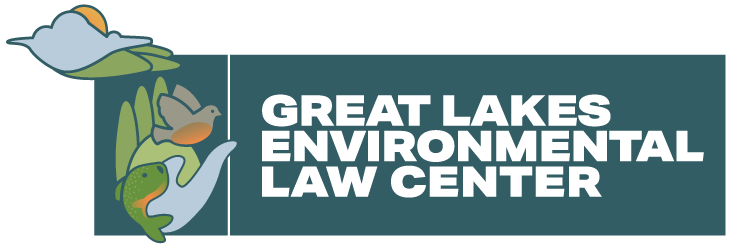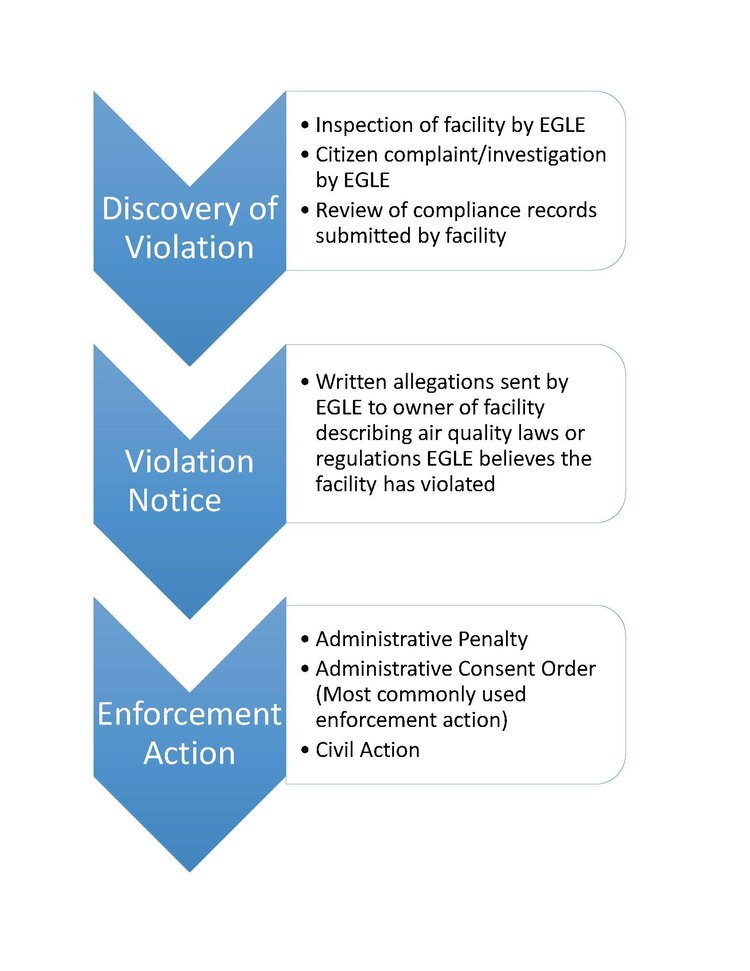
Air Quality Enforcement Tracker
The Air Quality Enforcement Tracker is a public resource for community residents and organizations. It compiles information from multiple databases to inform the public about violations of air quality regulations at major sources of air pollution in Wayne County and enforcement actions taken by the Michigan Department of Environment, Great Lakes, and Energy (EGLE) to address the violation. Specifically, it provides the following information:
List of violation notices issued by EGLE to major sources of air pollution in Wayne County.
List of enforcement actions taken by EGLE in response to a violation.
Public hearing information for any proposed administrative consent orders to address air quality violations in Wayne County.
This resource has been made possible through the generous support of the Fred A. and Barbara M. Erb Family Foundation.
The Enforcement Process
EGLE is the primary enforcer of air quality laws and regulations in Michigan.
In general, the enforcement process starts with EGLE inspecting facilities, investigating citizen complaints, and reviewing compliance reports that facilities are required to submit.
If EGLE believes that a facility has or is currently violating a federal or state air quality law or regulation and wants to pursue an enforcement action, it must first issue a written violation notice to the owner of the facility that describes the air quality laws or regulations the facility is alleged to have violated.
After issuing a violation notice, EGLE may pursue an enforcement action against the owner of the facility. If EGLE decides to pursue an enforcement action, it will first issue an enforcement notice to the company asserting that EGLE is pursuing formal legal action to address the violations. An enforcement action generally takes the form of either an administrative penalty, an administrative consent order, or a civil action.
-
In general, air pollution complaints are submitted to EGLE by calling their 24/7 Pollution Emergency Alerting System (PEAS) Hotline: 800-292-4706.
Once a complaint is received, EGLE will investigate to determine whether there has been a violation of an air quality law or regulation.
EGLE does investigate complaints regarding odors, dust, or other releases of air pollution from facilities. This includes dark plumes of smoke being emitted from smokestacks.
EGLE generally does not respond to complaints regarding excessive noise from industrial facilities or regarding truck traffic on residential streets.
-
No. EGLE is not required to enforce every violation of an air quality law or regulation, and it has the power to decide which violations it wants to enforce and which it does not.
-
In general, there are three different types of enforcement actions EGLE may bring:
Administrative Fine
- EGLE issues an administrative fine of up to $10,000 per each instance of violation;
- EGLE cannot issue an administrative fine of more than $100,000;
- No public notice and comment requirement.
Administrative Consent Order
- Settlement agreements negotiated by and between EGLE and the company that has violated an air quality law or regulation;
- Commonly include the following: requirements to pay a penalty to the State general fund; requirements for the owner of the facility to take specific actions to address the cause of the violation; and requirements to conduct a community benefit project (commonly referred to as a “supplemental environmental project” or “SEP”);
- EGLE must provide public notice and comment before finalizing an administrative consent order.
Civil Actions
- Lawsuit filed on behalf of EGLE to resolve violation;
- No public notice and comment requirements.
By law, EGLE is first required to attempt to negotiate an administrative consent order with a company that has violated an air quality law or regulation.
The vast majority of EGLE's enforcement actions are administrative consent orders.
-
While not formally adopted, EGLE commonly relies on the EPA’s Clean Air Act Stationary Source Penalty Policy to determine the appropriate amount to fine a company for a violation of an air quality law or regulation. That policy can be accessed here: https://www.epa.gov/sites/production/files/documents/penpol.pdf
Fines collected from any enforcement action go to the State’s general fund. This money can be used for any purpose.
-
Supplemental environmental projects (commonly referred to as “SEPs”) are environmentally-beneficial projects that an owner of a facility may agree to fund and implement as a condition of an enforcement action. They are sometimes included as requirements in an administrative consent order. Examples of SEPs include the following:
- Installation of air filtration systems at local schools/homes to improve indoor air quality;
- Installation of vegetative buffer around a facility or high-traffic roadways to limit human exposure to air pollution;
- Retrofitting diesel engines with better pollution control technology.
To read more about SEPs, please go to the resources page on our website to access a report published by the Great Lakes Environmental Law Center regarding how SEPs can be used to further environmental justice in air quality enforcement.
Violation Notices Regarding Major Sources of Air Pollution In Wayne County
Below is a list of all violation notices that the Michigan Department of Environment, Great Lakes, and Energy has sent to major air pollution sources in Wayne County. It may take EGLE several months to finalize an enforcement action. Additionally, EGLE may choose not to pursue an enforcement action for a violation.
This list was last updated on 1/24/25.
Proposed Administrative Consent Orders Undergoing Public Notice And Comment In Wayne County
EGLE addresses most violations of air quality laws and regulations through an administrative consent order. These orders are settlement agreements negotiated by EGLE and the violator. Administrative consent orders commonly require the violator to pay a penalty to the State general fund, require the violator to take steps to fix their facility, and require the violator to fund and implement a supplemental environmental project to improve air quality in the neighborhood where the violation occurred.
EGLE requires public notice and comment before it finalizes any administrative consent order.
Information regarding how to submit a public comment and the location of public hearings, as well as access to proposed consent orders, is available at this link.
This chart was last updated on 1/24/25.


